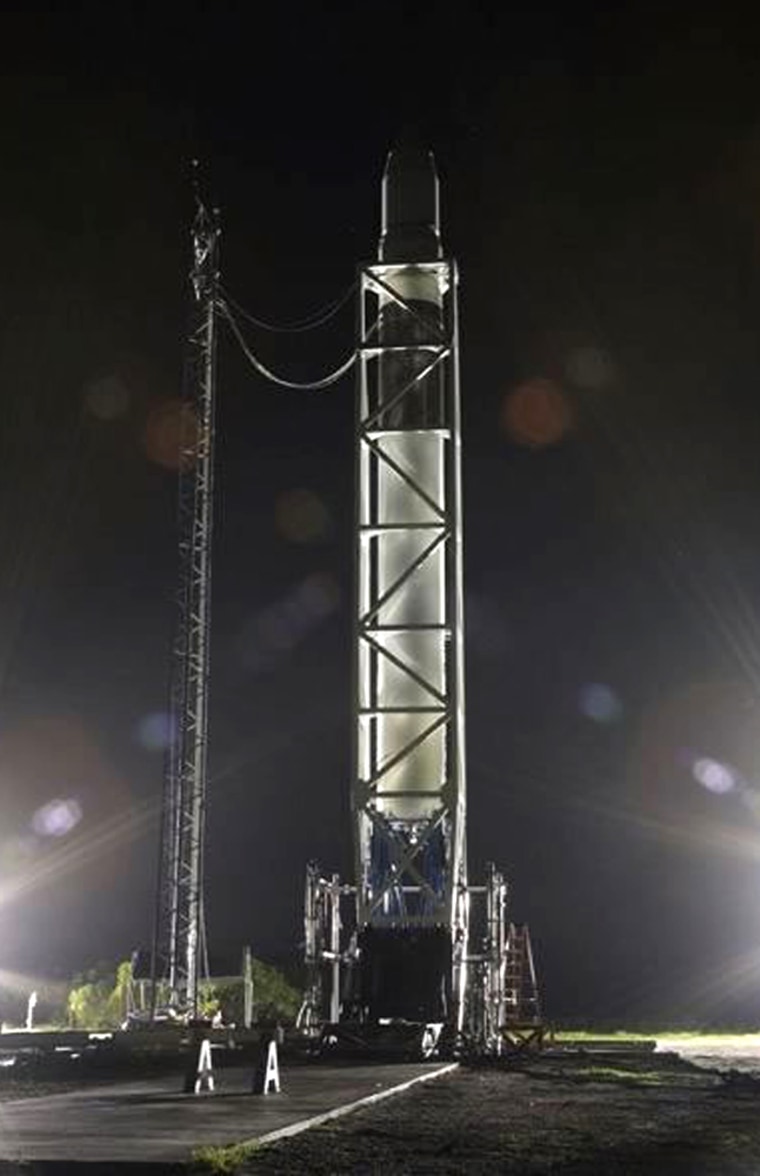An upstart rocket company postponed its first-ever satellite launch on Saturday after a series of last-minute snags.
A spokeswoman for Space Exploration Technologies Corp. told MSNBC.com that it will be a minimum of one or two weeks before the company, also known as SpaceX, can try again. Dianne Molina said the delay was due to the need to ship liquid oxygen and helium to the launch complex on an island in the Pacific Ocean's Kwajalein Atoll.
SpaceX developed its partially reusable Falcon 1 rocket as a low-cost alternative in a space launch industry dominated by aerospace giants Boeing Co. and Lockheed Martin Corp. This first-ever launch is being funded by the Defense Advanced Research Projects Agency, or DARPA, with a payload sponsored by the Air Force.
The Pacific launch area, part of the U.S. Marshall Islands, is also used for tests of the Pentagon's National Missile Defense System. In fact, SpaceX's big event had already been postponed for 24 hours, from Friday, due to the Army Space and Missile Defense Command's need to prepare for the unrelated launch of a missile defense test vehicle.
The first scheduled launch time on Saturday was set for 4 p.m. ET, but there was a snag in the final minutes of the countdown, according to Larry Williams, SpaceX's vice president for international and governmental affairs. Williams, who was keeping reporters updated about the developments in Kwajalein via a teleconference from the company's headquarters in El Segundo, Calif., could not immediately say what caused this delay.
Weather concerns halted the countdown at the T-minus-10-minute mark, followed by another delay when technicians had to fix a venting problem in the liquid-oxygen tanks at the launch pad. The original four-hour launch window was then extended until 10 p.m. ET, but to no avail.
Next attempt delayed
Molina said so much liquid oxygen and helium had been lost during the countdown that the supply had to be replenished from Hawaii, more than 2,000 miles (3,200 kilometers) to the northeast. "It's a minimum delay of one to two weeks," she said.
In a statement, SpaceX’s founder and chief executive officer, Elon Musk, blamed the delay on the liquid-oxygen leak as well as a computer glitch:
“What happened was that an auxiliary liquid oxygen (LOX) fill tank had a manual vent valve incorrectly set to vent. The time it took to correct the problem resulted in significant LOX boil-off and loss of helium, and it was the latter that caused the launch abort. LOX is used to chill the helium bottles, so we lose helium if there is no LOX to cool the bottles. “Although we were eventually able to refill the vehicle LOX tanks, the rate at which we could add helium was slower than the rate at which LOX was boiling away. There was no way to close the gap, so the launch had to be called off. In addition, we experienced an anomaly with the main engine computer that requires further investigation and was arguably reason in and of itself to postpone launch.”
Rocky rocket road
For its first payload, SpaceX is to send up FalconSat 2, a satellite built by the U.S. Air Force Academy as part of a program to monitor the effect of space plasma on satellite communications systems.
The launch represents the first of what SpaceX hopes will be a series of low-cost liftoffs from Kwajalein as well as Vandenberg Air Force Base in California. The estimated price tag for a launch of the partially reusable Falcon 1 is about $6.7 million, far less than the cost of similar launches from more established companies. SpaceX already has won a military contract worth up to $100 million for small-scale launches through 2010.
SpaceX also is working on a fully reusable, heavy-lift version of the Falcon that could loft payloads or even people to the international space station and beyond.
The road to the first launch has not been smooth: During its testing phase, SpaceX has had to cope with engine problems as well as legal snags over its engine technology and the use of Vandenberg's rocket range. SpaceX also filed a lawsuit against Boeing and Lockheed Martin, accusing them of violating antitrust laws by forging a new joint venture to seek government launch contracts.
Musk, who built his fortune in the software industry by helping to found successful companies such as PayPal, says he has invested about $100 million over the past three years or so to get his company to this point — and he cautioned reporters a week ago that the Falcon 1 launch wouldn't necessary go off right on time. The rocket's readiness, rather than a calendar date, would determine when the first launch would take place, he said.
He recalled that cautionary tone in Saturday's statement: "As I warned, the likelihood of an all new rocket launching from an all-new launch pad on its first attempt is low," Musk said.
